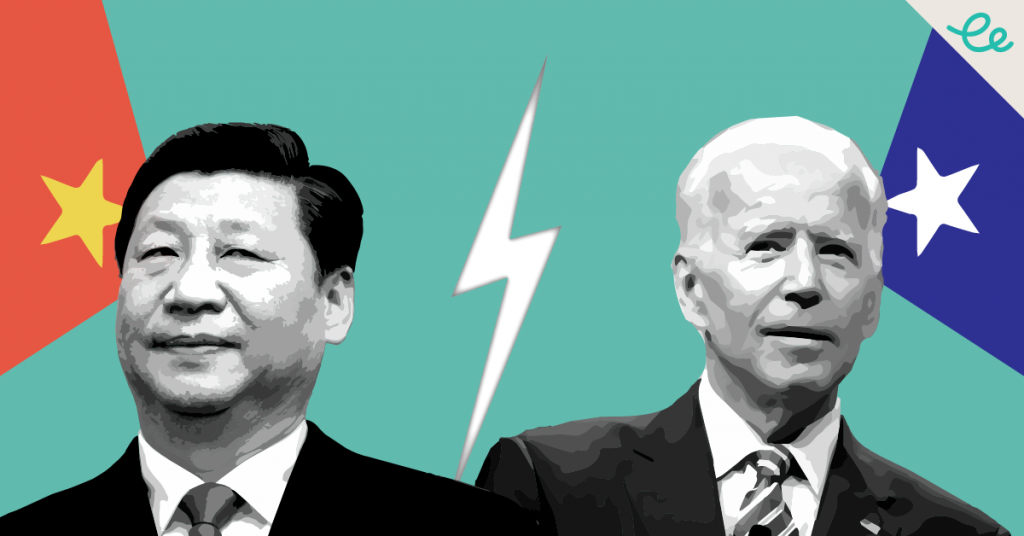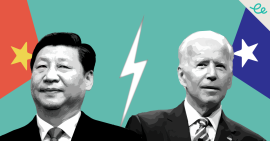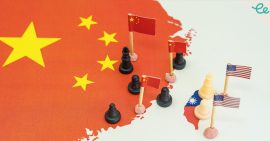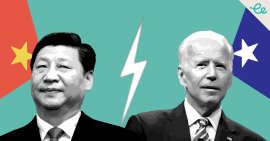Standing on the deck of an US Navy destroyer, at Japan’s Yokosuka naval base, US Vice President Kamala Harris directly challenged China on September 28. She accused it of “disturbing behaviour” and “provocations” around Taiwan. Harris said Washington would in response “deepen our unofficial ties” to the self-governed island that Beijing considers part of its territory.
The US will also “continue to fly, sail and operate, undaunted and unafraid, wherever and whenever international law allows”, including the Taiwan Strait, she added. Washington “does not seek conflict with China”. But “we anticipate continued aggressive behaviour from Beijing as it attempts to unilaterally undermine the status quo.”
Taiwan
Fifty years on from the President Nixon visit to China that kickstarted decades of co-operation and tension, the Biden administration is increasingly standing up to China on the one bilateral issue that threatens a conflict even worse than Ukraine.
President Joe Biden said on September 18 that US forces would defend Taiwan in the event of a Chinese invasion. This is the fourth such statement during his time in office. The State Department yet again walked back his remarks to confirm that US policy towards Taiwan remained unchanged. But Biden’s repeated and consistent “off-script” statements suggest he is, in practice if not in name, shifting from “strategic ambiguity” to “strategic clarity” to deter a Chinese attack.
The stakes are sky-high. “If President Biden plans to defend Taiwan, then he should make sure the US military has the capability to do so,” said Asia expert Bonnie Glaser. “Rhetorical support that isn’t backed up by real capabilities is unlikely to strengthen deterrence.”
The One China Policy
The US has not shifted its stance on Taiwan and remains committed to the one China policy. Beijing’s “overreaction” for two months since the Taiwan visit of US House Speaker Nancy Pelosi risks a peaceful resolution. This was said by Washington’s ambassador to China Nicholas Burns on September 29.
The view from Beijing is that America is the one changing the status quo regarding Taiwan. China’s Foreign Ministry reacted angrily to Biden and Harris, complaining that the US had violated its pledge to respect China’s territorial integrity.
Foreign Minister Wang Yi met with US Secretary of State Antony Blinken on September 23 at the UN in New York. This was one of multiple meetings Wang held to drive home Beijng’s position on Taiwan and other Chinese “core interests”. “China-US relations are facing grave impacts,” Wang warned, as “[recent US actions] have sent a truly wrong and dangerous signal.” Wang told world leaders at the UN that “Taiwan has been an inalienable part of China’s territory since ancient times” and“any move to obstruct China’s cause of reunification is bound to be crushed by the wheels of history”.
With the world’s largest navy, China is now well positioned to impose a naval blockade of Taiwan if necessary, warned Commander of the US 7th Fleet Vice-Admiral Karl Thomas. “They have a very large navy, and if they want to bully and put ships around Taiwan, they very much can do that,” he said.
While Xi Jinping has told his military that he wants to have the capability to take control of Taiwan by force by 2027, CIA Deputy Director David Cohen said the intelligence community doesn’t currently believe that Beijing has made a decision about whether to proceed.
Joe Biden and Xi Jinping
Joe Biden would love to bend Xi’s ear, in person, about Taiwan, China’s support for Ukraine and other pressing matters. He likes getting up close and personal. And especially with his toughest adversaries. Biden has long boasted of his unique relationship with Xi, thanks to many hours together as vice presidents.
But the wait goes on. Twenty months after Biden took office, the complex, crucial business of US-China relations still lacks an in-person presidential summit. It’s easily the longest delay in recent decades before a newly inaugurated US president meets his Chinese counterpart (Bill Clinton was the record holder: meeting Jiang Zemin 10 months after entering the White House in 1993).
Beijing’s zero-Covid policy partly explains Biden’s lack of renewed face time with Xi, although the pair have spoken by phone and video link. But real summits still matter. They carry more than just symbolic significance when navigating the troubled ties of the world’s largest two economies.
Xi’s first foreign foray in more than 900 days
Xi finally left Fortress China for the first time since January 2020, to visit Kazakhstan and Uzbekistan from September 14-16. He attended a regional security summit where Xi met Russian President Vladimir Putin (yet) again. Biden’s best bet remains meeting Xi on the sidelines of the G20 Heads of State and Government Summit from November 15-16 in Bali, Indonesia. “If he’s there, I’m sure I’ll see him,” said Biden on September 6.
Putin also plans to be in Bali, setting the stage for an incredibly tense – and important – gathering. Xi has also confirmed his participation at the November 18-19 Asia-Pacific Economic Cooperation (Apec) summit in Bangkok, but Biden will reportedly skip Bangkok to attend a granddaughter’s wedding.
By then, Xi will have concluded the 20th Party Congress, starting October 16, where the Communist Party will cement Xi’s place as the most powerful Chinese leader since Mao Zedong. His political work report will include policy priorities for the next five years (his precedent-breaking third term), notably on economic development and international relations.
Policy shifts on Taiwan
As observers look for signs of policy shifts on Taiwan (considered a “domestic issue” by Beijing), in the US the Taiwan Policy Act was passed by the Senate Foreign Relations Committee and goes forward to the full Senate. The Act aims to designate Taiwan as a major non-NATO ally and requires the US government to allocate funding for Taiwan’s defence for the next five years. Beijing is not amused.
Neither nation appears willing to concede enough ground to make meaningful progress, so the best to be hoped for may be establishing “guardrails” to prevent outright conflict, whenever Biden and Xi do meet again. It may be clutching at straws, but the personal bond they built in 2011 and 2012 “is one of the few things that we have going for us in the relationship,” Danny Russel, a former State Dept official, told Politico.
Related articles:
Pelosi’s Flying Visit to Taiwan Sends US China Relations into Tailspin





